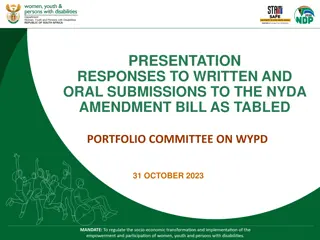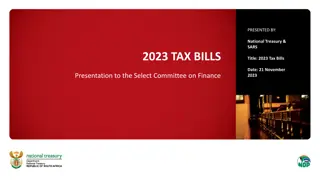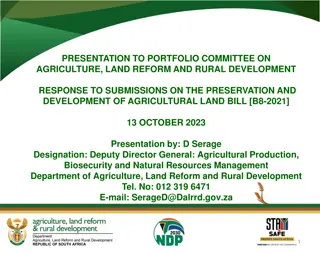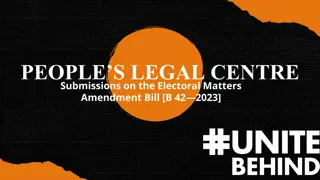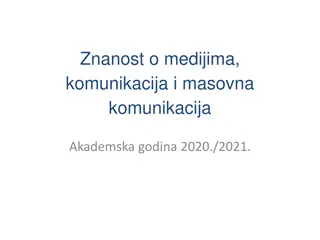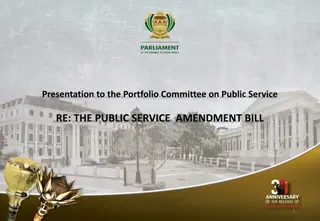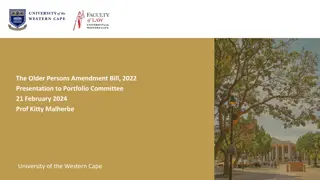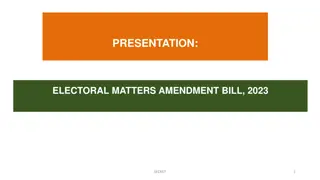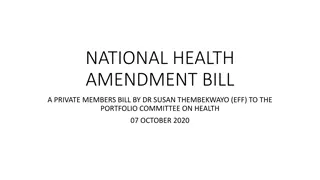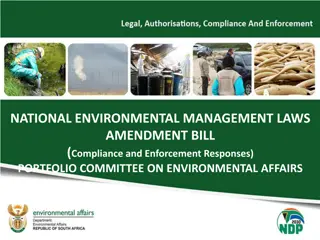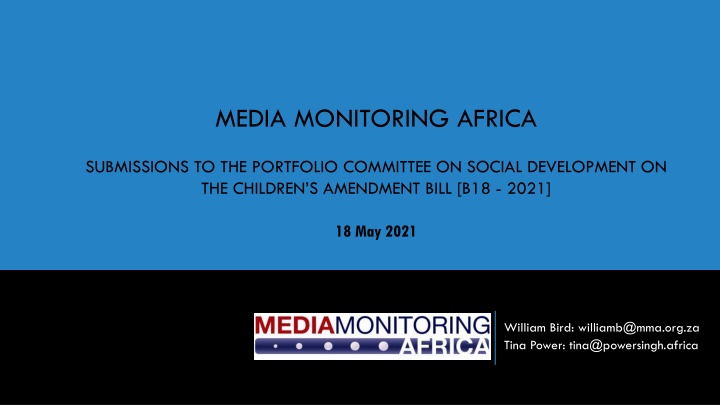
Children's Privacy Rights in the Digital Era: MMA Submission Overview
Explore Media Monitoring Africa's insightful submission to the Portfolio Committee on Social Development regarding the Children's Amendment Bill. Delve into children's online rights, privacy perceptions, personal information protection, proposed amendments, and more.
Download Presentation

Please find below an Image/Link to download the presentation.
The content on the website is provided AS IS for your information and personal use only. It may not be sold, licensed, or shared on other websites without obtaining consent from the author. If you encounter any issues during the download, it is possible that the publisher has removed the file from their server.
You are allowed to download the files provided on this website for personal or commercial use, subject to the condition that they are used lawfully. All files are the property of their respective owners.
The content on the website is provided AS IS for your information and personal use only. It may not be sold, licensed, or shared on other websites without obtaining consent from the author.
E N D
Presentation Transcript
MEDIA MONITORING AFRICA SUBMISSIONS TO THE PORTFOLIO COMMITTEE ON SOCIAL DEVELOPMENT ON THE CHILDREN S AMENDMENT BILL [B18 - 2021] 18 May 2021 William Bird: williamb@mma.org.za Tina Power: tina@powersingh.africa
Brief overview of MMA Children s right to privacy Children s rights in an online context OVERVIEW OF SUBMISSION Children s perceptions and participatory rights Protection of personal information and identity protections Proposed textual amendments to section 6A
ABOUT MEDIA MONITORING AFRICA Not-for-profit organisation Submissions, strategic litigation, and advocacy processes relating to the triad of information, including children s information rights. Working with, and on behalf of children: Parliamentary submissions, submissions to various Ministries, and submissions to the United Nations Committee on the Rights of the Child Web Rangers Applicant in Centre for Child Law v Media 24 Limited Amicus Curiae in AmaBhungane Centre for Investigative Journalism v Minister of Justice Developed guidelines, discussion documents: children s rights including privacy rights, data protection, identifying children in the media
Article 16 CRC Article 10 ACRWC THE RIGHT TO PRIVACY Section 14 Constitution
General comment 25 Declaration of Principles on Freedom of Expression and Access to Information CHILDREN S RIGHTS IN THE DIGITAL ERA POPIA, Children s Amendment Act
CHILDRENS PERSPECTIVES DIGITAL RIGHTS CHARTER: Children have a right to privacy online Their personal information needs to be protected Children s privacy and personal data must be safeguarded. Where data is collected, children must be informed about how the data is collected and used. Consent to process a child s data must be informed and freely given by the child or, depending on the child s age and maturity, by the parent or caregiver. Children retain the right to withdraw their consent and object to personal data processing, taking into consideration any overarching public interest considerations. Children who are victims, survivors, witnesses or are in conflict with the law have the right to have their identity protected.
CHILDREN'S PARTICIPATION IN ADVANCING THEIR PRIVACY RIGHTS Terms and conditions, and associated policies of social media platforms and other online spaces that are used by children, which may implicate their privacy, their personal information, and any other rights, must be provided with child- friendly versions of all policies. Children must participate in decisions that implicate their privacy and their personal information Children should be appropriately informed of how their personal information is collected, stored, and processed. Such policies must take into account the evolving capacities of children and must be drafted in a manner that enables children to make informed decisions online. Children s right to participate online is likely only to meaningful to the extent that children are digitally literate.
THE VARIOUS FACETS OF CHILDREN S PRIVACY RIGHTS Data protection & personal information Identifying information
THE PROTECTION OF PERSONAL INFORMATION IDENTITY PROTECTION Public disclosure of identifying features of children Context processing personal data / Personal Information Contrary to the principle of the best interests of the child and the rights to dignity and privacy to have the identity of children who are victims, survivors, witness or are in conflict with the law, publicly disclosed Rights of data subjects Processing personal information in a lawful manner
1. Bill needs to explicitly set out the content and ambit of the right to privacy for children, both on- and offline. 2. The Bill should further make clear that this extends to appropriate protection against unlawful data processing, data exploitation and surveillance, as unjustifiable limitations on the right to privacy well as other RECOMMENDATIONS 3. The right to privacy should form part of Chapter 2 on General Principles and should be a stand-alone section, providing scope and meaning to children s privacy rights. 4. Section 74 should not be deleted, but rather incorporated in the expanded section on children s privacy rights. 5. Section 6A should be expanded.
Every child has the right to have privacy respected, protected promoted, both on- and offline. SECTION 6A
A childs right to privacy includes but is not limited to: The protection of their personal information. Where applicable the provisions of the Protection of Personal Information Act 4 of 2013 will apply. Safeguards for ensuring the protection of children s personal data must include the following: Any processing of the personal information of a child must be done in such a manner that protects the rights of, and is in the best interests of the child. Where the personal information of a child is collected, the child must be informed about how the data is collected and used. Information on the processing of personal information shall be provided in a simple, clear and accessible manner, taking into account the evolving capacities of children, to ensure that a child will be able to understand what will happen to their personal data. SECTION 6A Any person or entity processing the personal information of children must adopt privacy policies for such purposes. Such policies must be user- friendly and accessible for parents and caregivers with diverse digital literacy and literacy skills. All privacy policies must be accompanied by child-friendly versions, taking into account the evolving capacities of children, and must be drafted in a manner that enables a child to make informed decisions about their personal data. Children must be protected against all forms of unlawful data processing and data exploitation. Surveillance regimes that may impact children must be subject to the privacy rights and the principle of the best interests of the child and must include child-sensitive safeguards.
The protection from the publication of identifying information: No person shall publish in any manner, including via social media or other online platforms, any information relating to the proceedings of a children s court which reveals or may reveal the name or identity of a child who is a party or a witness in the proceedings. Provided that the presiding judge or judicial officer may authorise the publication of such information as they may deem fit if the publication would, in their opinion, be just and equitable and in the public interest taking into account the principle of the best interests of the child. SECTION 6A Where applicable the provisions of the Criminal Procedure Act 51 of 1977 will apply.
Appropriate and accessible digital, media, and information literacy trainings must be made freely available to all children to ensure their privacy and participatory rights are adequately safeguarded. SECTION 6A
For further information, please contact: William Bird, Director Media Monitoring Africa williamb@mma.org.za THANK YOU Tina Power, Associate Power Singh Incorporated tina@powersingh.africa


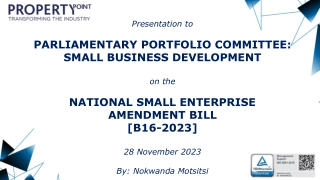
![RE: ELECTORAL MATTERS AMENDMENT BILL [ B42-2023]](/thumb/18837/re-electoral-matters-amendment-bill-b42-2023.jpg)

